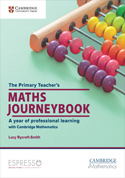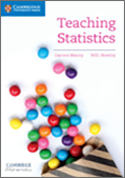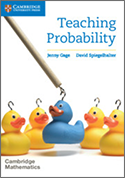
Books
Cambridge Mathematics has published or supported publication of several books, the latest of which is their professional learning book for primary and early years mathematics teachers, The Primary Teacher's Maths Journeybook: A Year of Professional Learning. The book is designed around their popular Espressos, creating space around them to ask questions, annotate, reflect and critique educational research more generally – and the pages are designed to be written in and annotated, meaning the whole year's worth of professional learning is neatly kept all in one place. Also included are added extras such as seasonal coffee recipes, questionnaires, and even a template to make a hexaflexagon.
Two books have so far been published in the Teaching series: Teaching Probability by Jenny Gage and David Spiegelhalter, and Teaching Statistics by Will Hornby and Darren Macey. This series sets out a detailed approach to the teaching and learning of mathematics based in pedagogy and practices supported by education research. Each book contains detailed examples and practical classroom activities to support both the professional development of mathematics teachers & practitioners, and the practical day-to-day activity of teaching.

The Primary Teacher’s Maths Journeybook: A Year of Professional Learning
Based on the popular Espressos from Cambridge Mathematics, which provide clear and accessible summaries of recent mathematics education research, this reflective journeybook contains everything a primary/early years teacher needs for a year's worth of evidence-informed professional learning in mathematics education.

Teaching Statistics
Statistics has developed in parallel with the advances of technological and social change. Informed by the work of the Cambridge Mathematics team, this book outlines a new pedagogical approach to teaching statistics.

Teaching Probability
Written by leading subject specialists, Teaching Probability is designed to support teaching concepts in probability by providing a new approach to this difficult subject from a perspective not limited by a syllabus, giving teachers both theoretical and practical knowledge of an innovative way of teaching probability